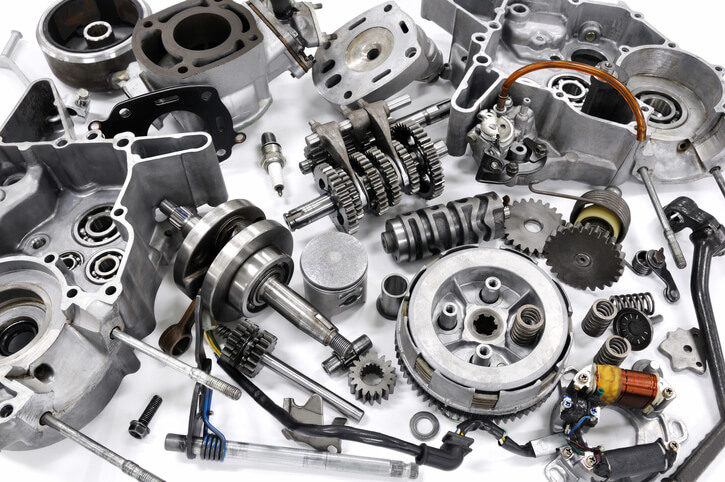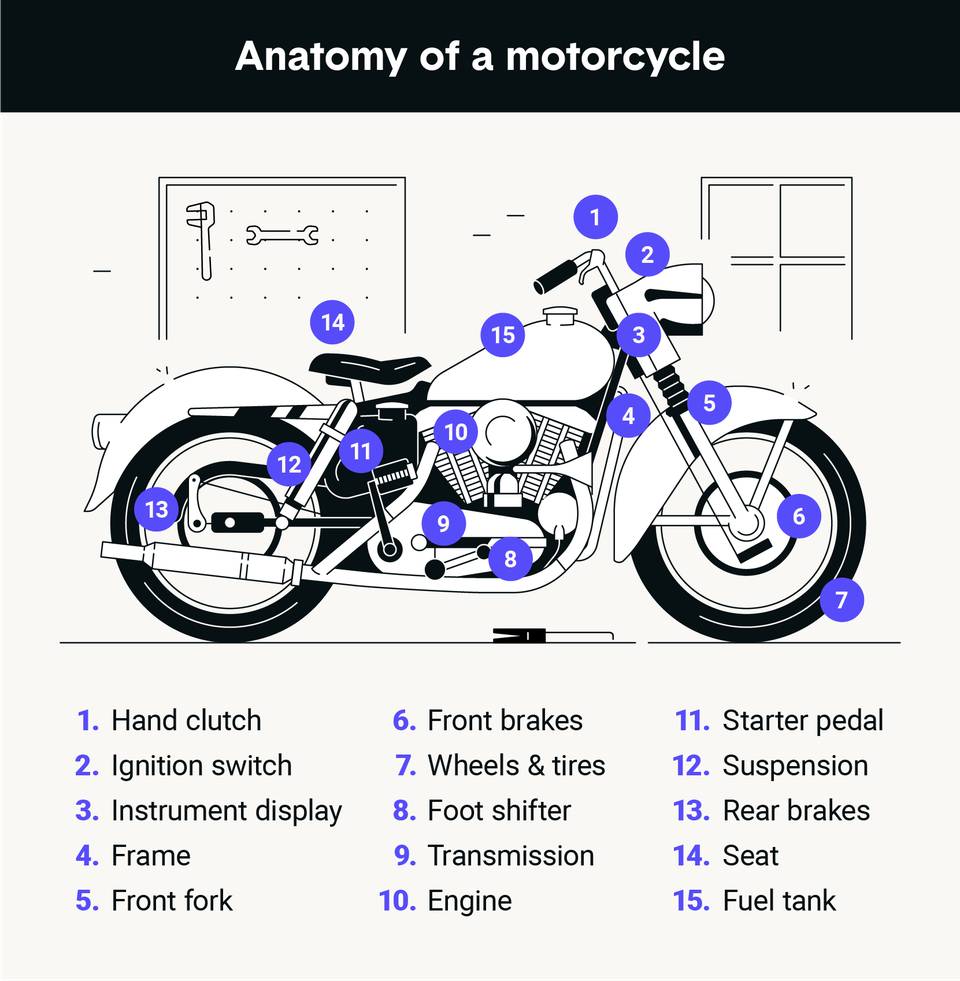Discover the Necessary Motorcycle Parts You Required for Optimal Efficiency
Recognizing the crucial components of a motorbike is basic for accomplishing peak performance. Each element, from the engine to the braking system, plays a crucial duty in general capability and safety. Regular maintenance can protect against unforeseen failures and improve the riding experience. Nonetheless, lots of riders neglect the ins and outs of these systems. Finding just how they interact can cause an extra reliable ride. What important parts should every biker focus on?
The Engine: The Heart of Your Bike
The engine offers as the core part of a bike, driving its performance and defining its abilities. It is accountable for converting gas right into mechanical power, which powers the bike forward. Various sorts of engines are utilized, including single-cylinder, V-twin, and inline setups, each offering distinctive features fit for various riding styles and purposes. The engine dimension, typically measured in cubic centimeters (cc), substantially affects performance, with larger engines typically supplying more power and torque.Furthermore, the engine's style and innovation, such as fuel injection systems or air-cooling versus liquid-cooling, influence efficiency and reliability. Upkeep is vital for peak procedure; factors like regular oil changes and checking trigger connects guarantee longevity. Riders usually consider an engine's responsiveness and level of smoothness, as these characteristics enhance the total riding experience. Ultimately, the engine continues to be a critical aspect that defines not only the motorcycle's efficiency but likewise the biker's connection to the device.
The Transmission: Moving Gears Efficiently
The transmission plays a crucial duty in a motorbike's efficiency, especially in the mechanics of equipment shifting. Comprehending how to shift equipments smoothly can boost the overall riding experience, while regular upkeep assurances peak functionality. Correct interest to these elements can considerably impact the long life and effectiveness of the bike.

Equipment Shifting Mechanics
Smooth gear shifting is essential for optimal motorbike performance, greatly influencing both velocity and control. The mechanics of equipment moving involve the interaction in between the clutch, gear bar, and transmission system. When a motorcyclist involves the clutch, it disengages the engine from the transmission, enabling an equipment change without harming the parts. A well-timed launch of the clutch, combined with exact motion of the equipment lever, promotes a seamless adjustment in between gears. This procedure guarantees that the engine operates within its ideal power band, enhancing performance. Motorcycle Parts Auckland. Furthermore, understanding the equipment ratios and their result on rate and torque can assist cyclists make notified selections during shifts, ultimately adding to an extra responsive and delightful riding experience
Maintenance Tips Value
Regular upkeep plays an important role in ensuring that the transmission system operates effectively, permitting smooth equipment changes. Routinely examining and changing the transmission liquid is crucial, as old liquid can bring about boosted rubbing and wear. In addition, examining the clutch for wear assurances peak engagement and disengagement, stopping slippage during equipment adjustments. Lubrication of relocating parts is similarly crucial to reduce friction and improve efficiency. Motorbike proprietors should likewise monitor for leakages and uncommon noises, as these can suggest underlying concerns. By sticking to these upkeep ideas, riders can prolong the life expectancy of their transmission system, assuring that gear changes continue to be smooth and adding to the total performance of their motorcycle.
The Braking System: Ensuring Safety on Every Ride
Braking systems are basic parts that straight affect a motorcycle's security and efficiency. They include different parts, consisting of brake pads, rotors, calipers, and hydraulic lines, all collaborating to guarantee effective deceleration. The kind of braking system-- typically either disc or drum-- impacts responsiveness and quiting power.Regular maintenance is important to copyright peak performance; used brake pads can cause reduced effectiveness and raised stopping distances. Additionally, the high quality of brake liquid must be checked, as it can absorb dampness gradually, endangering stopping efficiency.Riders must also consider the value of anti-lock braking systems (ABS), which avoid wheel lockup throughout abrupt quits, boosting overall security. Properly operating brakes are not nearly stopping; they instill confidence in the rider, permitting more secure navigating via numerous surfaces. Ultimately, a trusted stopping system is crucial for appreciating every experience with peace of mind.
The Suspension: Enhancing Convenience and Control
A well-functioning suspension system substantially contributes to a motorcycle's total efficiency, matching the performance of the stopping system. The suspension plays a significant role in taking in shocks from uneven surfaces, guaranteeing a smoother ride while maintaining tire contact with the roadway. This contact is essential for both stability and control, allowing cyclists to navigate edges with confidence and precision.Different types of shock absorber, such as telescopic forks or mono-shocks, offer differing degrees of convenience and handling. Effectively tuned suspension improves responsiveness, offering the motorcyclist with a much more connected feeling to the motorbike. Regular maintenance checks are crucial to determine the suspension components, consisting of dampers and springs, are functioning at their finest. An efficient shock absorber not just raises the riding experience yet additionally adds to the durability of various other motorbike components by decreasing wear and tear. Because of this, purchasing quality suspension is crucial for any kind of major motorbike lover.
The Tires: Attaching You to the Road
Tires play a vital duty in a motorbike's efficiency, working as the primary link in between the biker and the road. Recognizing the different sorts of tires offered can substantially impact dealing with and safety. Furthermore, routine upkeep is essential to guarantee peak tire performance and durability.
Tire Enters Explained
How do different tire kinds affect a motorbike's performance? Tire kinds play a crucial role in figuring out a motorcycle's handling, hold, and security. Sporting activity tires, made for high performance, deal enhanced grip and responsiveness on smooth roadways, making them ideal for competing and aggressive riding. On the other hand, touring tires focus on longevity and comfort, providing a smoother ride for long-distance travel. Off-road tires, defined by their sturdy step patterns, master traction on unpaved surface areas, appropriate for experience lovers. Additionally, dual-sport tires blend attributes from both on-road and off-road categories, satisfying functional riding needs. Inevitably, choosing the best tire type is important for optimizing efficiency, guaranteeing security, and enhancing the general riding experience.
Maintenance Tips Offered
While riding when traveling, maintaining perfect tire problem is important for safety and performance. Routinely examining tire pressure is very important, as under-inflated tires can result in inadequate handling and boosted wear. It is recommended to check tread depth often; used tires compromise hold and security. Additionally, riders need to try to find indications of damages, such as bulges or fractures, which can indicate the demand for substitute. Turning tires periodically assures even put on, enhancing durability. Furthermore, maintaining tires clean from debris and preventing extreme curbs can prolong their life expectancy. Keeping proper alignment and equilibrium adds to come to a head performance, reducing stress on various other bike components. Sticking to these maintenance pointers will greatly improve the overall riding experience.
The Fuel System: Fueling Performance and Performance
The fuel system plays an important duty in making the most of a motorcycle's efficiency and performance, as it guarantees the optimum delivery of gas to the engine. It comprises numerous vital parts, including the gas storage tank, gas pump, fuel filter, and gas injectors or carburetor. Each part must work effectively to assure a effective and smooth ride.The gas tank shops gas and supplies it to the engine through the gas pump, which produces the necessary pressure. A gas filter prevents impurities from entering the engine, while the injectors or carburetor mix fuel with air for combustion.Proper maintenance of the gas system is important; a stopped up filter or malfunctioning injector can look what i found cause reduced performance and raised fuel consumption. By verifying that the gas system runs effectively, bikers can delight in improved throttle response, far better fuel economic situation, and on the whole boosted riding experience.
The Electrical System: Powering Your Adventure
A reliable electric system is necessary for the general performance and safety of a motorbike, as it powers crucial parts such as the ignition, lighting, and numerous electronic systems. This system consists of the battery, which stores power, and the alternator, in charge of producing power while the engine runs. The wiring harness attaches these components, guaranteeing trustworthy power distribution.Additionally, fuses secure the system from overloads, while relays assist manage high-current devices with low-power signals. A well-kept electrical system enhances efficiency by ensuring smooth starts and regular procedure of signals and lights, vital for motorcyclist visibility and safety.Regular checks of the battery's fee and links are necessary for stopping electric failures. Bikers ought to additionally check wiring for wear and tear, making sure all components work ideally. Inevitably, a durable electric system contributes substantially to the overall efficiency and integrity of the motorcycle.
Regularly Asked Questions
Exactly how Often Should I Change My Motorbike's Battery?
The regularity of motorcycle battery replacement depends upon use and maintenance (Oem Parts New Zealand). Typically, batteries should be changed every 3 to 5 years. Normal checks can help identify when a substitute is essential for peak performance
What Devices Do I Required for Standard Motorbike Upkeep?
For standard bike upkeep, one calls for essential tools such as a socket set, wrenches, screwdrivers, pliers, tire stress gauge, and a torque wrench. These devices help with effective upkeep and assure the motorbike runs efficiently and securely.
Just How Can I Enhance My Motorbike's Aerodynamics?
To boost motorbike the rules of aerodynamics, one must think about changing fairings, using windshield expansions, optimizing body position, and reducing total weight. These alterations help reduce drag, boosting stability and fuel efficiency throughout experiences.
What Are the Signs of a Failing Electrical System?
Indicators of a falling short electrical system consist of dimming lights, problem starting, uneven tool readings, and blown merges. Motorcycle Parts Auckland. Uncommon smells or deterioration around battery terminals may additionally show underlying problems requiring prompt attention for safety and security and performance

How Do I Choose the Right Oil for My Motorbike?
When choosing oil for a motorcycle, one should consider the manufacturer's requirements, viscosity scores, and the sort of riding. In addition, artificial versus conventional web link oil can affect efficiency and engine defense, affecting the choice substantially. The engine dimension, normally determined in cubic centimeters (cc), significantly influences performance, with bigger engines typically supplying even more power and torque.Furthermore, the engine's style and technology, such as fuel shot systems or air-cooling versus liquid-cooling, influence effectiveness and integrity. A well-functioning suspension system significantly contributes to a motorbike's total efficiency, matching the efficiency of the stopping system. The fuel system plays an important function in optimizing a motorcycle's performance and efficiency, as it assures the optimal delivery of gas to the engine. A fuel filter prevents pollutants from getting see this site in the engine, while the injectors or carburetor mix fuel with air for combustion.Proper upkeep of the gas system is crucial; a stopped up filter or malfunctioning injector can lead to lowered efficiency and raised fuel intake. A properly maintained electrical system enhances performance by making certain smooth beginnings and consistent operation of lights and signals, essential for motorcyclist presence and safety.Regular checks of the battery's fee and links are vital for protecting against electrical failures.
Comments on “Maintenance Schedule for Keeping Your Motorcycle Spares Christchurch in Peak Shape”